Managing farms abroad: Experiences and challenges
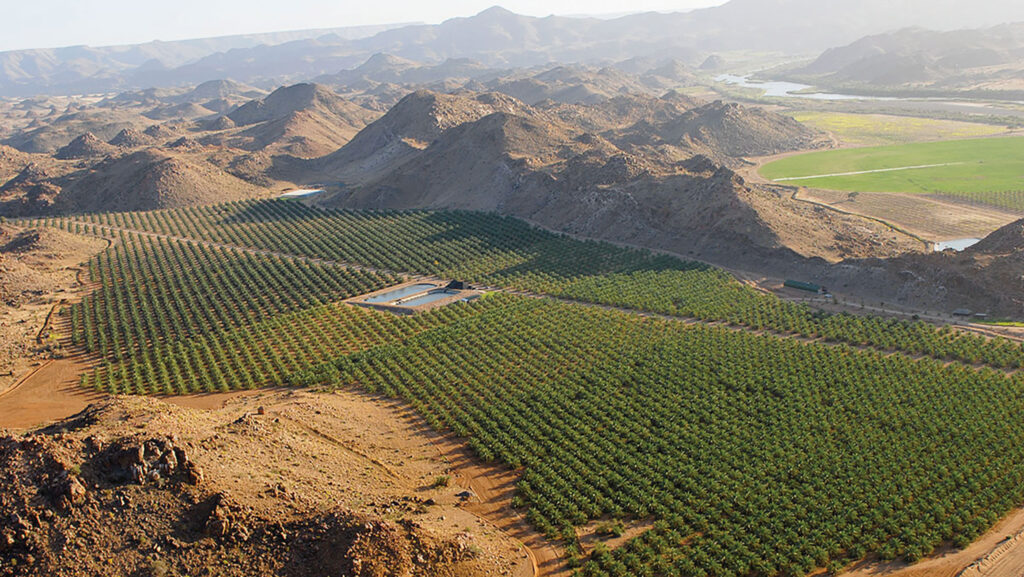 Desert Fruit date farm in Namibia © Desert Fruit
Desert Fruit date farm in Namibia © Desert Fruit Working on or managing farms in other countries brings a host of experience that can enrich and enhance an individual’s approach to work and to life.
“Be prepared” is the advice from those who have spent many years doing this, though it’s rarely possible to anticipate some of the contrasts and challenges these posts bring.
See also: Farm cash flow advice as pressure mounts
Luke McCall
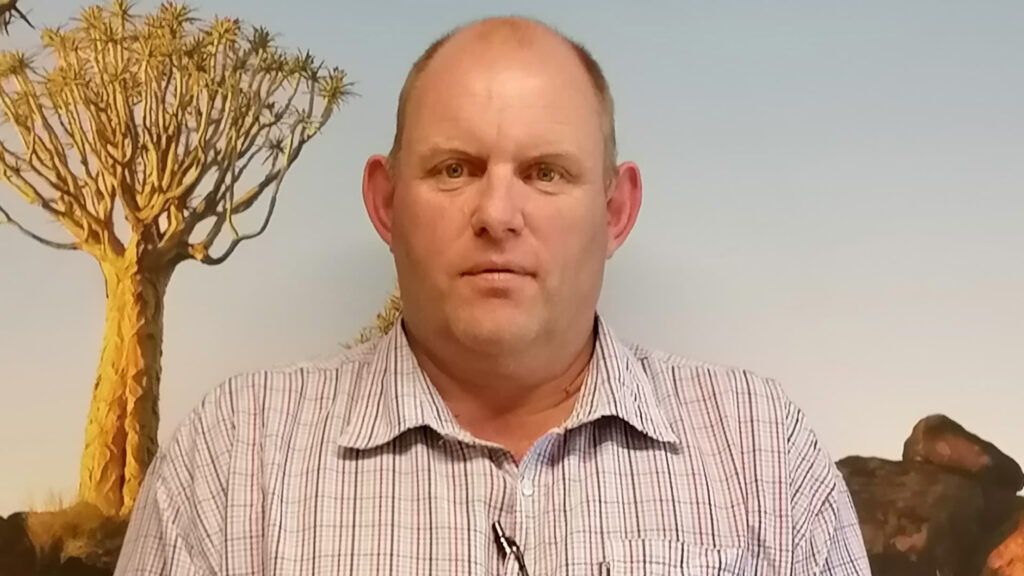
Luke McCall © Desert Fruit
Luke McCall is operations manager for Desert Fruit, a date farming business in Namibia.
He works in a remote location where getting to the nearest shops means a drive of more than 120 miles.
On site there are large parts stores, power generation, water purification, maintenance teams and housing for workers.
Luke oversees the farming and the packhouse, with 160 permanent staff and about 600 when harvesting.
His first job abroad was in Spain in 1998, as junior farm manager for Emmets, through an advert in Farmers Weekly.
Prior to this, he had run his own successful agri/landscaping business for 10 years after attending Sparsholt College in Hampshire.
Luke has also worked on farms in the UK, Portugal, Czech Republic, Russia, Egypt, Panama and Costa Rica, growing or overseeing almost 30 different crops from high-end salads and vegetables to large-scale arable and specialist crops such as dates and pineapples.
The farms he has worked on range from 150ha to 20,000ha, with business turnovers of £2m to £500m and between 500 and 2,000 employees.
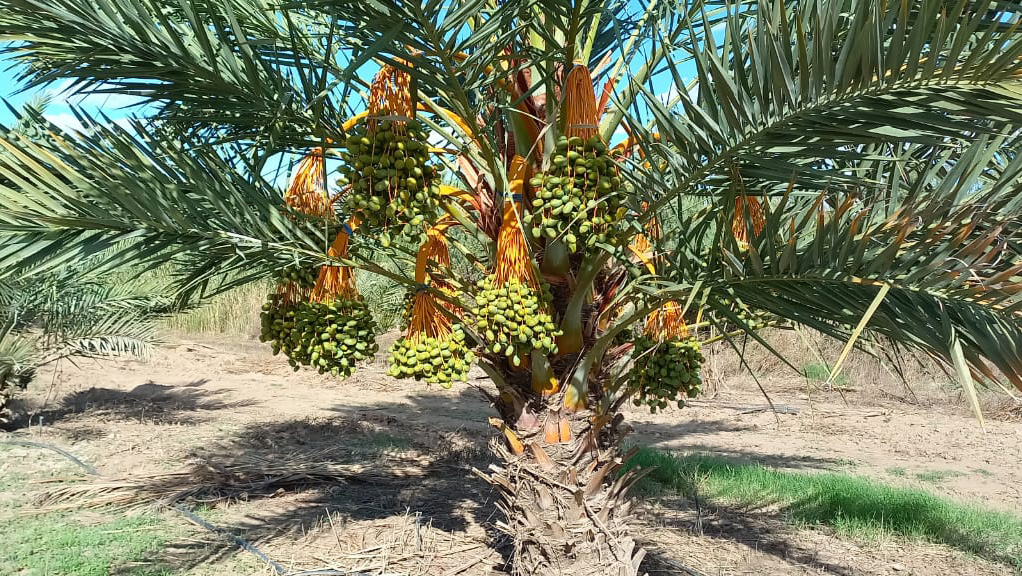
© Luke McCall
Advantages
He lists the advantages of working abroad as climate, people and life experiences, and seeing how other countries do what we do well in UK farming.
“The disadvantages are that you miss out on important family events, a holiday is never a holiday if you return to the UK, just catching up with people when all you want to do is relax.
“Now we have WhatsApp and other communication aids, it makes it easier to keep up with people at home.”
Certain countries stand out for him as preferred places to work.
“I loved my time in Spain when I started out, Costa Rica was beautiful, and in the Czech Republic I met my wife.
“But I would have to say Russia for the vast farming operations and the sheer size of farms.
“As a group, we farmed 250,000ha and my neighbour farmed 400,000ha as if it was 500ha.
“Portugal was probably the easiest – the farm staff were easy going and the people and machinery dealers could not be more helpful.
“There were something like seven different crops to look after so always something going on, and when you fancied a little life, you could head 1.5 hours to the Algarve.”
Russia was, in some ways, the most difficult, he says.
“In other parts of the world I had managed to read and write some of the local language, but in Russia that was very hard.
“We had full-time translators to help with managing day-to-day operations that could be units of 8,000ha and multiple units spread over a 120km triangle.”
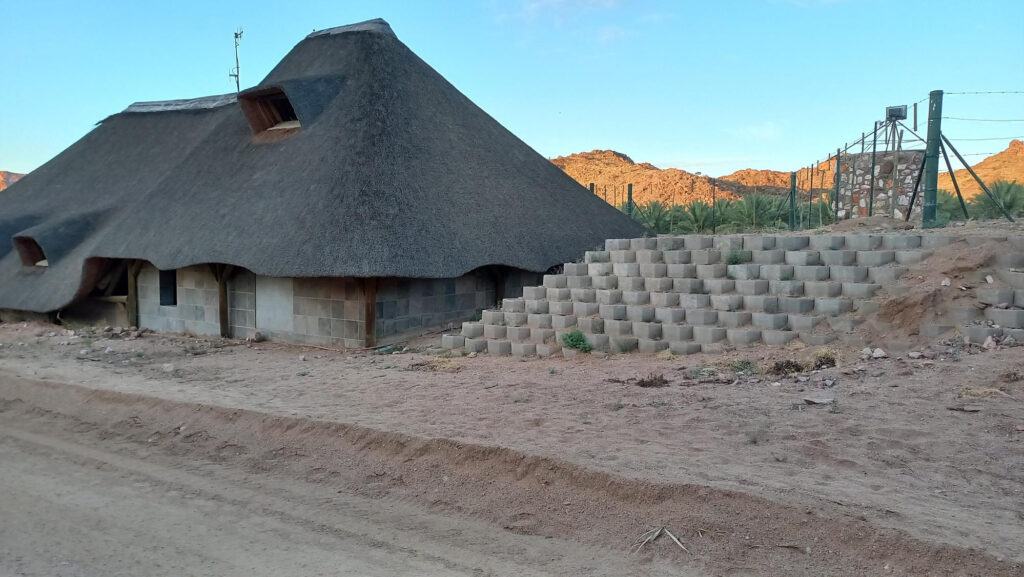
Desert Fruits irrigation pumping station © Luke McCall
Contrasts
The biggest contrast in many countries compared with working in the UK is probably not having an agronomist that visits, a lab that can test plants and consultant help where needed, he says.
“Everything is a challenge, and if you love challenges, learning on the job and, on top of that, living in a different world, eating different foods, learning a language or two, then you would be perfect for overseas management.
“No two days are ever the same but add a foreign factor to farming in terms of climate and workforce and there is never a dull moment.”
Difficulties have included guns and knives being waved at him, corruption and theft both on farms and by local governments, mafia involvement on some farms, intimidation from gang leaders and workers, along with corrupt police forces.
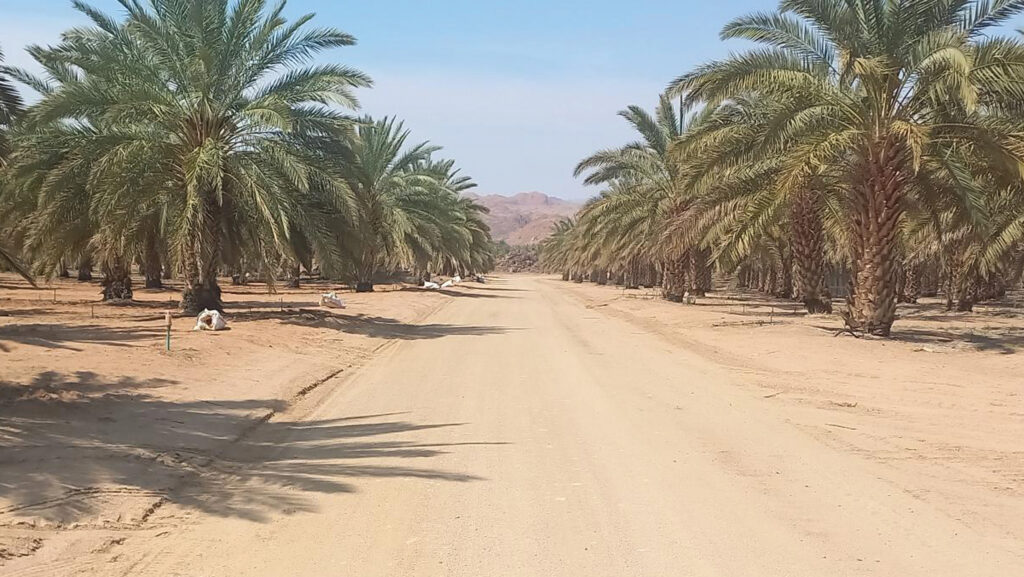
Zamli date trees © Desert Fruit/Luke McCall
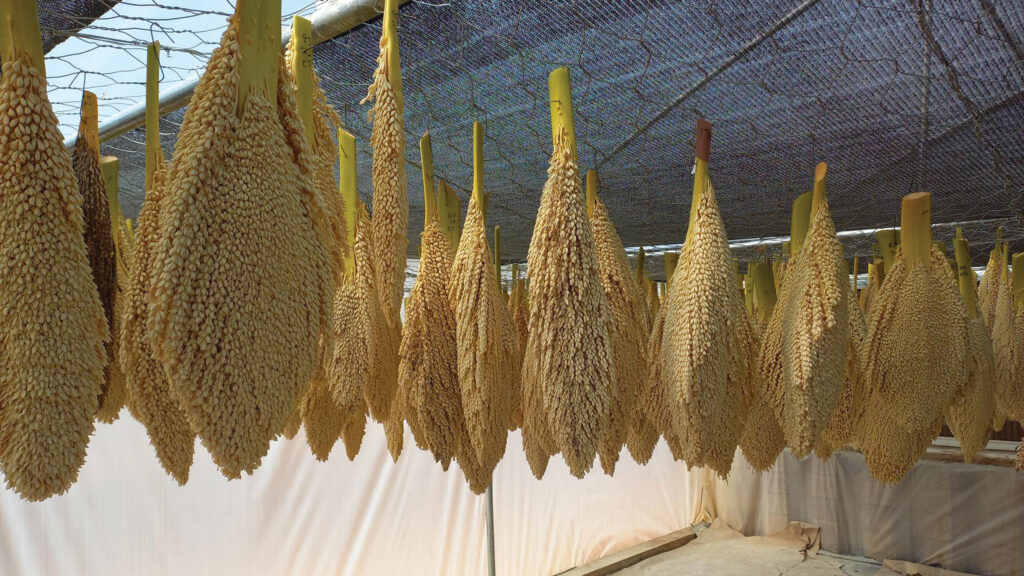
Male date tree flowers drying © Desert Fruit/Luke McCall
Luke’s tips
- You don’t necessarily need a degree – good practical experience is what is needed and this will grow with you and in time
- Ability to lead is important – it is always harder as a foreigner in a country to prove yourself as the locals will always say “what can he or she bring that we don’t already know”
- Have an entrepreneurial outlook on farming and life and good, rounded skills in farming
- Be hungry to learn new practices and ideas, however foreign compared with what we do in the UK
- An outgoing personality helps, so that you can make friends with people both in the work environment and locals, and local suppliers
- A can-do attitude is good – your dealer may be eight hours away – can you bush mechanic it to make it work for a few days?
- Having a family that either goes with you or allows you to follow your dreams makes it all a lot easier, otherwise constant problems at home become a problem for you while abroad and trying to learn so much in the first three months of your post
- Always ensure you have enough in the bank, after all bills are paid, to pay for a flight out of the country if needed in an emergency
- Always carry US dollars (the currency of the world) – you never know when you may need that small cash amount to pay a bribe, mend a car or just simply buy a drink
- Don’t be afraid to apply for a job/position that may be slightly higher than where you see yourself in the UK. There may be a number of reasons why you may fit in and some of what you question yourself on may be covered by a retiring person that could teach or help you
- Believe in what you can do and have a passion, as with experience will come knowledge and leadership
- Watch out for the job that just sounds too great – if it does not feel right, investigate further
- If possible, visit the farm or country for your interview – look at the farm and accommodation, shops and what you or your family may need
- Don’t think of the earning potential until you are sure it’s the job for you, as if it’s not right, it does not matter what the salary, you will always be struggling to be happy
- Check out the country on the UK government website – the money may be big, but think about security
- As your experience grows and you join a small group of expat farmers around the world, you will hear of companies that don’t look after staff and management – these are the ones to steer clear of. At the same time, you will hear of others that do all they can to make your experience of working for them the best of your life
- Be aware that your salary could attract the attention of unscrupulous people
Mark Randall
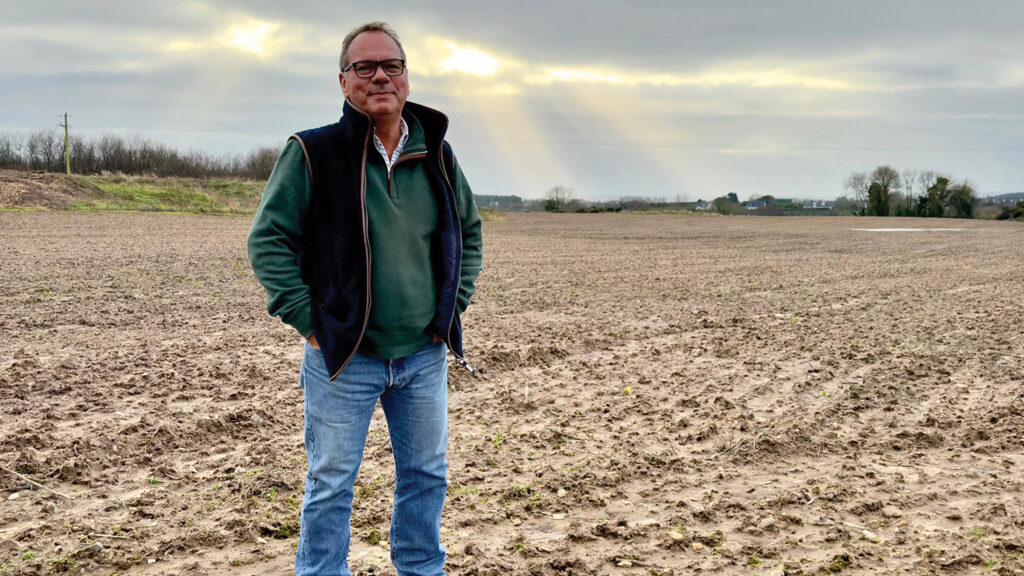
© Mark Randall
Mark Randall’s work in farming started with 10 years on Co-operative Wholesale Society farms, followed by a similar period on a Norfolk estate as farms director.
During this time, he helped the business with an investment in land in Argentina, which triggered his interest in farming in other countries.
Through an advert in Farmers Weekly about 18 years ago, Mark got a farm management job in Russia, where he spent nine months.
“Mark Randall wasn’t ready for Russia and Russia wasn’t ready for Mark Randall at the time,” he laughs.
“I had a young family and there were lots of dynamic changes going on in my life.
“After doing a few bits locally in the UK, I had a call with an offer to go back to Russia, which I initially refused, but then returned and spent about four-and-a-half years in the fertile Black Earth region [south-west of Moscow and bordering Ukraine].
“Then I moved to another company in another part of Russia, which I totally loved, but then Mr Putin decided he liked the look of Crimea.
“The farming business was 97% owned by a Swedish government-backed pension fund, which decided to sell, so I left in 2015.
“By the time I left, we had all the kit, the telemetry, the main machinery manufactures were there and it was thriving.
“There was a big push by the Russian government to make sure everything was in production, it was very vibrant and I enjoyed that.
“If Putin hadn’t decided he liked Crimea, I might well have still been there and been fluent by now.”
Sudan and Uganda
A call from recruiter JP Trett then resulted in a position in Sudan, to set up a large Saudi- backed irrigation project.
“It was quite extraordinary, what we were doing in the middle of the desert, money was no object.”
This was followed by an “extraordinary” year in Uganda, on a farm with twice-a-year cropping and wonderful people, including up to 350 casuals a day.
The risk of malaria and a degree of poverty that made equipment security tricky were just two of the more challenging aspects.
“The real downside of the Uganda job was that I only saw my wife for two weeks a year.
“I subsequently moved to a job in Bulgaria, helping a farming family where the founding member, the grandfather, had died.
“The father had subsequently died so I was helping the young son who was left trying to change this business.
“They also had a big pig business, but I was responsible for the arable side, and changed the way they were doing things – brought in more technology, reduced labour and increased the machinery side.
“I worked with them for four-and-a-half years.
“I’ve just had 18 months in Romania with a hugely successful arable and trading business.
“I had met them previously and they were setting up an irrigation project on about 18,000ha.
“I went out there to do that but the last couple of years saw crop prices drop through the floor and so the project didn’t get beyond the planning stage.”
For family reasons, Mark decided to move back to the UK, taking a temporary position in Ireland with a salads and carrots business, which has since turned into a full-time general manager role.
Mark’s tips
- Wherever you are, different management styles can be frustrating. Sometimes you can influence things, sometimes you can’t, that’s simply how it is – some people might find that hard to accept
- Don’t always believe what you are being told – don’t be afraid to question things, even if you are ignored. If you have the opportunity to give feedback, negative or positive, that’s always a bonus
- Get behind the advert, find out about the role and get some personal trust with the recruiter so you can ask them some candid questions and be confident of getting straight answers. Ask if this is the first time the recruiter has tried to fill the position
- Once you work abroad, you can be pigeonholed by the attitude that “your experience is not relevant for the UK any more”, even if you have only been away a few years
- In conjunction with being out of UK farming for a time, there comes a point where younger, ambitious managers become more attractive because they are of now, and in many cases can be hired for less
- If you’re going to be an expat and are single, go for it
- If you are married, take your spouse and check out the job together and make a joint decision
- If you have the ability for the family to move with you, that makes it easier, but it’s not always an option
Roger Pyle
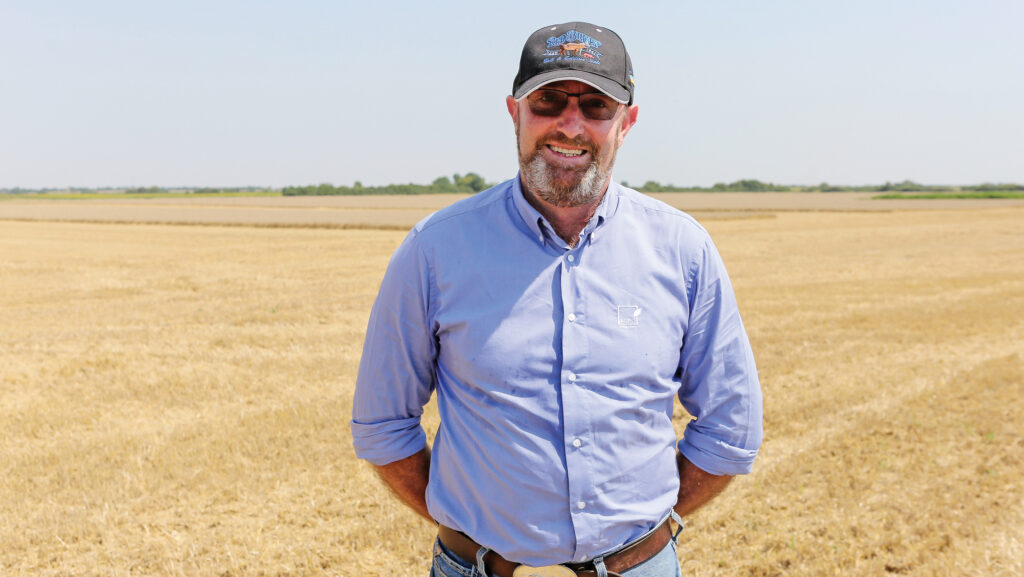
© Revista Ferma AgroConcept
Roger Pyle is the chief executive officer of AgroConcept, the exclusive dealer for New Holland and Kverneland in Romania, with 285 people in the team across 16 locations.
With extensive farm management experience in many countries, he also is on the board of advisers for the group’s 29,000ha farming operation in the country.
This includes 8,000ha of irrigation, mainly of arable crops, plus seed production.
Over many years, Roger has looked after more than 800,000ha in Ireland, the UK, South Africa, Namibia, Uganda, Egypt, Sudan, Morocco, Ghana, Algeria, UAE, Saudi Arabia, Qatar, the US, Russia, Romania and Hungary.
He was attracted by the ability to expand the area farmed, mentor farming teams, to diversify and add value, as well as the opportunity for integration both up and down the chain.
Originally from South Africa, where he farmed 3,000ha with dairy, beef and irrigated crop production including vegetables, his first few placements abroad were in Ireland, the UK and Romania, being headhunted in the UK by JP Trett and then placed in Romania by the firm.
Team management challenges
Working with diverse religious and cultural differences can be challenging when leading large teams, he says.
Roger sees the continent of Africa as the next big opportunity, from its population explosion and the vast untapped areas it offers.
“I love Romania, it has its problems like all countries, but the people and land for farming are one of the best in Europe.
“Every country has its unique challenges, and if one gets around the bureaucratic issues, I will say Romania has been one of the easier countries to work in – as long as you set up a good team that covers the fiscal/legal parts of the agricultural business, you will be OK.”
Egypt was the most difficult country, he says.
“We developed a 40,500ha irrigation project, potato storage and large 3,200ha project supplying PepsiCo.
“We had 2,000ha of citrus. It was ‘formula one’ farming, one crop out, another one in.
“No breaks, just a constant pressure on the team.
“Add the climate in the desert, 45C-plus in summer, and the distance to market was a real challenge for everyone.”
Surprising experience
The biggest contrasts with working in the UK are the scale of operation, the weather, team diversification and dealing with ever-changing legislation, as well as market immaturity in many countries, he says.
His most surprising experience was finding a field of corn in Russia’s Kursk region full of tanks and military equipment, with 500ha of maize destroyed.
The most difficult thing he has had to manage while working abroad was the remoteness of many of the farms in Egypt.
“Security and safety of staff was always at the back of my mind.
“We had a project in Egypt, about 60 miles from Libya. At the height of Isis, things were tense on the project.
“Dealing with the passing of a senior manager from a heart attack was also extremely sad and difficult.
“It’s mainly the human issues that are more complex.
“For the farming, if you have the capacities worked out correctly and you get your timing right, you can normally deal with any issues and resolve them fairly easily.”
Roger’s tips
- For those looking to work in another country, start in an established farming enterprise
- Get involved with everything, learn about all aspects of the business. Young people tend to love animals or equipment – these are important, but people make the business on large-scale farming enterprises
- Learn leadership skills, how to delegate, and get into the financial side of the business
Louis Lategan
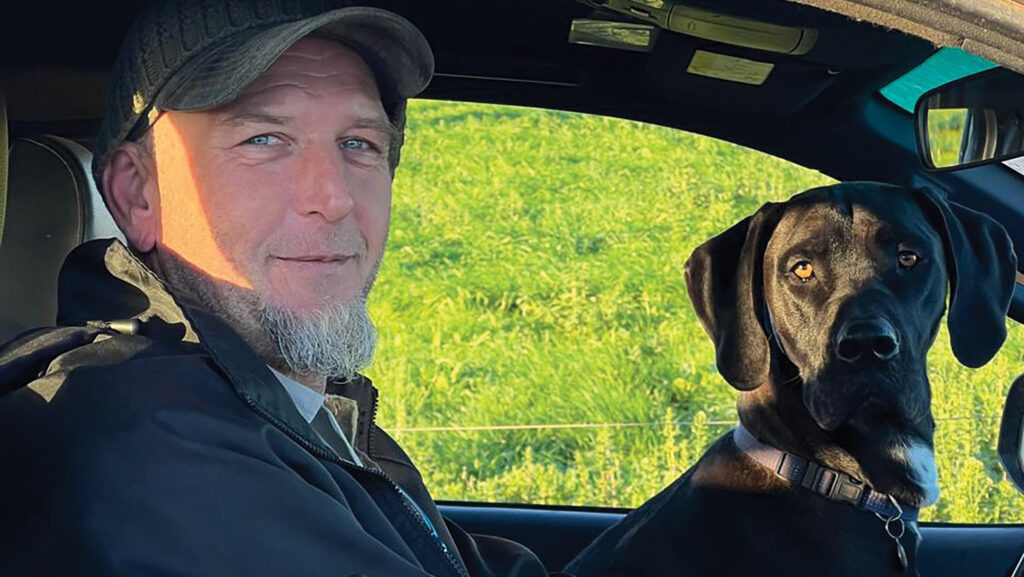
© Louis Lategan
Louis Lategan has spent a total of 23 years working on farms outside his native South Africa.
He is currently back in the country working with Southland Dairies in Tsitsikamma, which milks about 12,000 cows over three provinces on six farms.
His base farm employs about 25 people and pivot irrigates 350ha in summer.
The dangers of working on farms in South Africa was a big factor prompting him originally to leave the country, with family safety the priority.
Job scarcity and financial gain were other reasons, although the farming was the main attraction.
His first post abroad was in Botswana. Since then he has worked in Mozambique, Ghana, Benin, Liberia, Sierra Leone, Bourkina Faso, Mali, Togo, Nigeria, Sudan, Egypt, Saudi Arabia, Dubai, Qatar and Pakistan on many types of farm, including row cropping, pasture, fodder, plantations and dairy, working also on mechanisation of farms and irrigation development.
“The advantages are financial gain, travel opportunities, the legacy you leave in another country and the connections you make, as well as the languages and skills you pick up along the way,” says Louis.
“The disadvantages include being away from family, the discomfort that comes from being outside your culture – although that is an advantage, too.
“Being alone and safety concerns are the main ones.
Positive about Pakistan
“Pakistan was the easiest country for me to work in as I have a long history of Arabic and was able to pick up Punjabi and Urdu easily.
“I was given full control of all happenings from the moment I stepped foot into the country.
“The trust that was given to me definitely made the experience what it was – nothing short of great.”
He found Egypt the most difficult environment, mainly because of cultural and personality differences, while the most dangerous was Nigeria.
When working in developing countries, the challenges often include resources such as spare parts not being readily available.
“You also cannot go too modern with technology as the IT support is not always there.
“Fuel quality is also not always great, so one has to fall back on Tier 1 and 2 emission engines.”
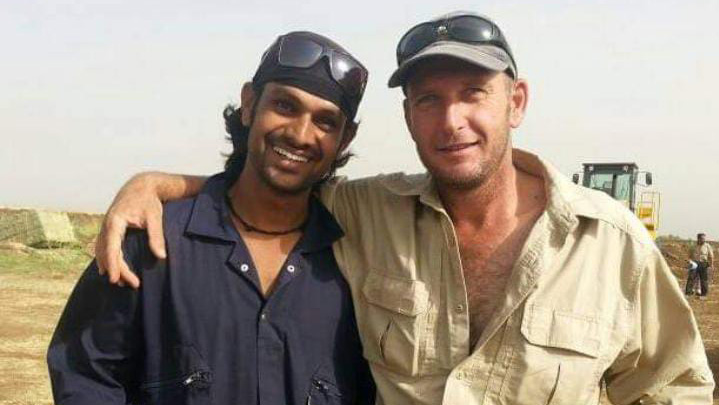
Louis Lategan and Sunny Parmarsharam in Sudan © Louis Lategan
Louis’ tips
- Always be ready to jump when you need to, be that sending out your CV or making a call, or taking a 20-hour trip away from home
- Make sure your documentation is correct – passport, visas, and so on
- Be ready to adapt and learn and be comfortable in discomfort, it’s how you grow
Opportunities in many countries for ‘best of the best’
James Trett, founder of recruitment agency JP Trett, places people in farm management, livestock, farming technology and machinery roles across the world.
He says there are many opportunities in a wide range of jobs, with the Middle East the biggest growth area.
Its businesses are hungry for staff and skills to join rapidly developing sectors seeking to boost domestic food supply and security.
“There are some phenomenal projects going on – strawberry production in Saudi and poultry in Iraq, for example, and a huge amount of investment in genetics and organics, too,” says James.
Those looking to work abroad should go in with their eyes open and do their due diligence checks, including a cultural assessment of the places they are considering, says James.
For example, many countries prohibit alcohol and employment law is often not as protective of workers as in the UK.
Conditions vary, but outside Europe, the locations will often be remote.
In some countries, life may be spent largely in a compound, with a multicultural workforce and sometimes in basic accommodation with a lot of time spent alone.
“Many places prefer candidates with a western education, with staff from the Netherlands, Germany and the UK largely considered to be well educated and trained,” he says, although there is increasing competition from Eastern Europe, Pakistan and India.
Positions typically run for two to three years, usually offering good earnings with tax advantages, if not tax free.
Compared with farm management roles here typically attracting packages of £60,000-£65,000, positions abroad start at about £75,000 and can go above £200,000.
